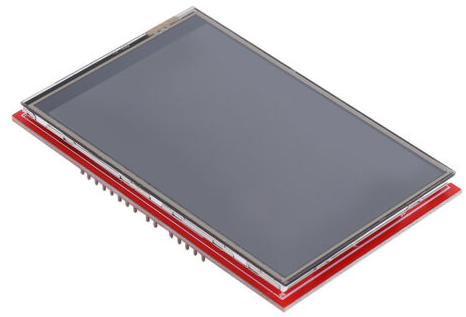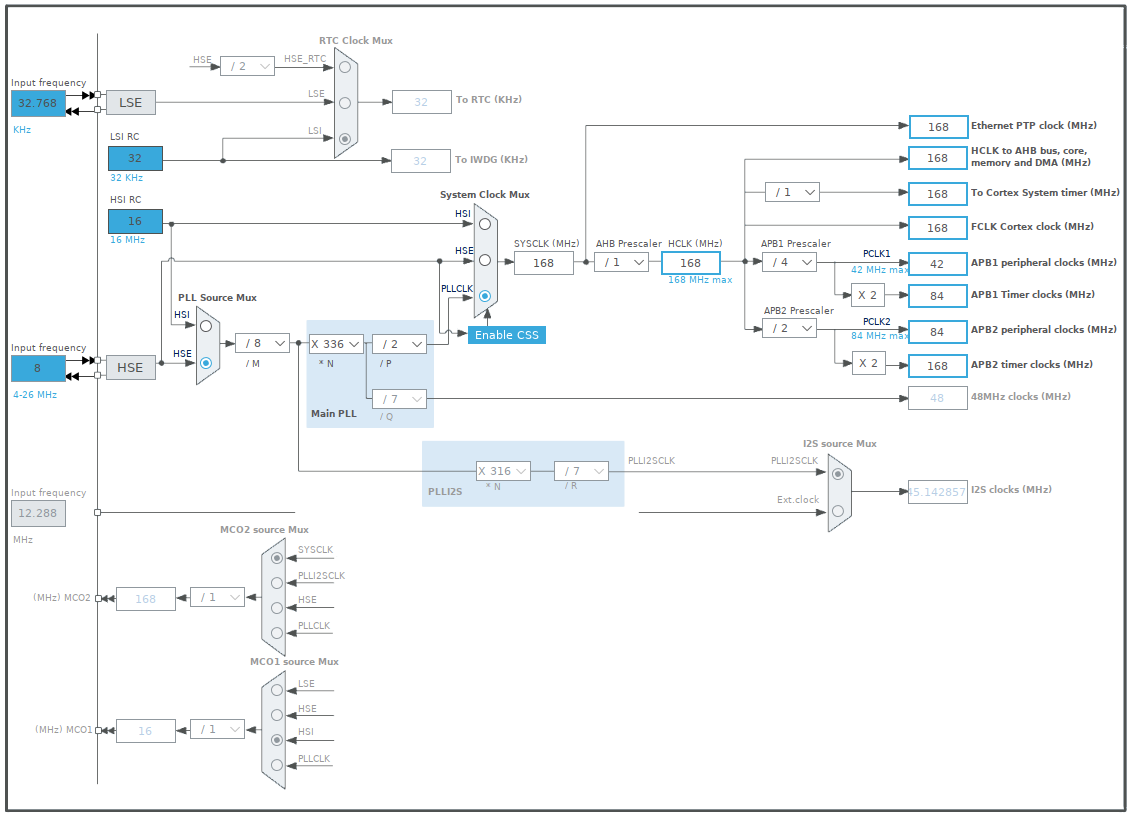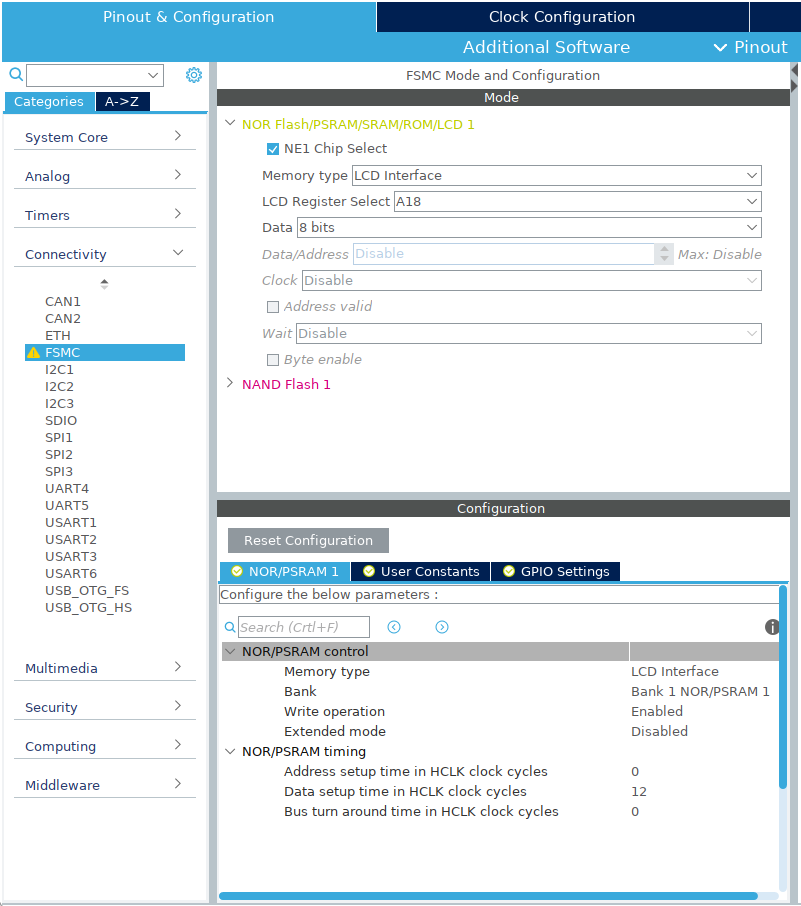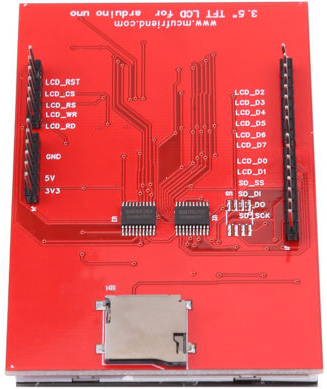3.5" inch TFT LCD Display Module 480X320 driven with FSMC.
TFT LCD Display Module 480X320 driven with FSMC
I have recently bought a 3.5" inch TFT LCD Touch Screen Display Module 480X320 with a www.mcufriend.com label on the back side. The display was equipped with an 8bit parallel interface. First I decided to test it with the UniGraphic library using the BUS_8 protocol. The display was very slow but improved when I switched to the PAR_8 protocol. Because I heard about the possibility to use a Flexible Static Memory Controller (FSMC), built into some STM MCU's, to drive LCD's (read/write to LCD's memory rather than to an external SRAM) I thought it would be a fun to try it out.

Below is the brief story of what I did:
- Created a project for my STM32F407VE board in the STM32CubeIDE
- Set the
Clock Configurationto match the one used by Mbed for the Seeed Arch Max board:
- Selected
FSMCin theConnectivitycategory and configured it as below:
- Let the
STM32CubeIDEgenerate the code (files). - Created a new program for the Seeed Arch Max target in the Mbed Online Compiler by selecting a
mbed os blinkytemplate. - Replaced the
main.cppwith themain.ccontent of theSTM32CubeIDEproject. Copy & Pastedthe other files with codes from theSTM32CubeIDEproject to the online compiler project.- Renamed and modified:
"stm32f4xx_it.h" to "stm32f4xx_it_msp.h"
"stm32f4xx_it.c" to "stm32f4xx_it_msp.c" - Added the UniGraphic library to the online compiler project.
- Extended the
UniGraphiclibrary with aFSMC_8protocol and replaced theTFT::set_orientation(int orient)function with the one used bymcufriendfor arduino. - Modified the
main.cppas needed.
 |  |
Wiring
| STM32F407VE | TFT LCD module |
|---|---|
| +3.3V | 3V3 |
| GND | GND |
| PB_12 | LCD_RST |
| GND | LCD_CS |
| PD_13 (RS) | LCD_RS |
| PD_5 (WR) | LCD_WR |
| PD_4 (RD) | LCD_RD |
| PD_14 (DB00) | LCD_D0 |
| PD_15 (DB01) | LCD_D1 |
| PD_0 (DB02) | LCD_D2 |
| PD_1 (DB03) | LCD_D3 |
| PE_7 (DB04) | LCD_D4 |
| PE_8 (DB05) | LCD_D5 |
| PE_9 (DB06) | LCD_D6 |
| PE_10 (DB07) | LCD_D7 |
Results
| Execution times | ||
|---|---|---|
| Used protocol | BUS_8 | FSMC_8 |
| Operation \ Time | ms | ms |
| Clear | 2283.980 | 38.454 |
| Plot | 192.066 | 11.365 |
| 8bit BMP | 63.805 | 41.338 |
| Large Font | 163.872 | 7.895 |
| Sparce pixels | 2072.265/1458.051 | 74.107/52.168 |
| 16bit BMP | 2288.589 | 59.904 |
UniGraphic/Inits/IST3020.h
- Committer:
- hudakz
- Date:
- 2020-09-25
- Revision:
- 1:47c996032a9e
- Parent:
- 0:fa952828e34c
File content as of revision 1:47c996032a9e:
#ifndef MBED_IST3020_H
#define MBED_IST3020_H
#include "mbed.h"
#include "LCD.h"
/** Class for IST3020 display controller
* to be copypasted and adapted for other controllers
*/
class IST3020 : public LCD
{
public:
/** Create a PAR display interface
* @param displayproto only supports PAR_8
* @param port GPIO port name to use
* @param CS pin connected to CS of display
* @param reset pin connected to RESET of display
* @param DC pin connected to data/command of display
* @param WR pin connected to SDI of display
* @param RD pin connected to RS of display
* @param name The name used by the parent class to access the interface
* @param LCDSIZE_X x size in pixel - optional
* @param LCDSIZE_Y y size in pixel - optional
*/
IST3020(proto_t displayproto, PortName port, PinName CS, PinName reset, PinName DC, PinName WR, PinName RD, const char* name, unsigned int LCDSIZE_X = 192, unsigned int LCDSIZE_Y = 64);
/** Create an SPI display interface
* @param displayproto SPI_8 or SPI_16
* @param Hz SPI speed in Hz
* @param mosi SPI pin
* @param miso SPI pin
* @param sclk SPI pin
* @param CS pin connected to CS of display
* @param reset pin connected to RESET of display
* @param DC pin connected to data/command of display
* @param name The name used by the parent class to access the interface
* @param LCDSIZE_X x size in pixel - optional
* @param LCDSIZE_Y y size in pixel - optional
*/
IST3020(proto_t displayproto, int Hz, PinName mosi, PinName miso, PinName sclk, PinName CS, PinName reset, PinName DC, const char* name, unsigned int LCDSIZE_X = 192, unsigned int LCDSIZE_Y = 64);
protected:
/** Init command sequence
*/
void init();
};
#endif